Property Law Report
VerifiedAdded on 2020/02/03
|10
|1732
|162
Report
AI Summary
This report discusses the Land Registration Act, 2002, focusing on the Mirror Principle and its implications for property law in the UK. It examines the act's objectives, the necessity for land registration, and the challenges posed by overriding interests. The report concludes that while the act aims to enhance transparency and efficiency in land registration, it faces significant limitations, particularly regarding the completeness of the information provided to buyers.
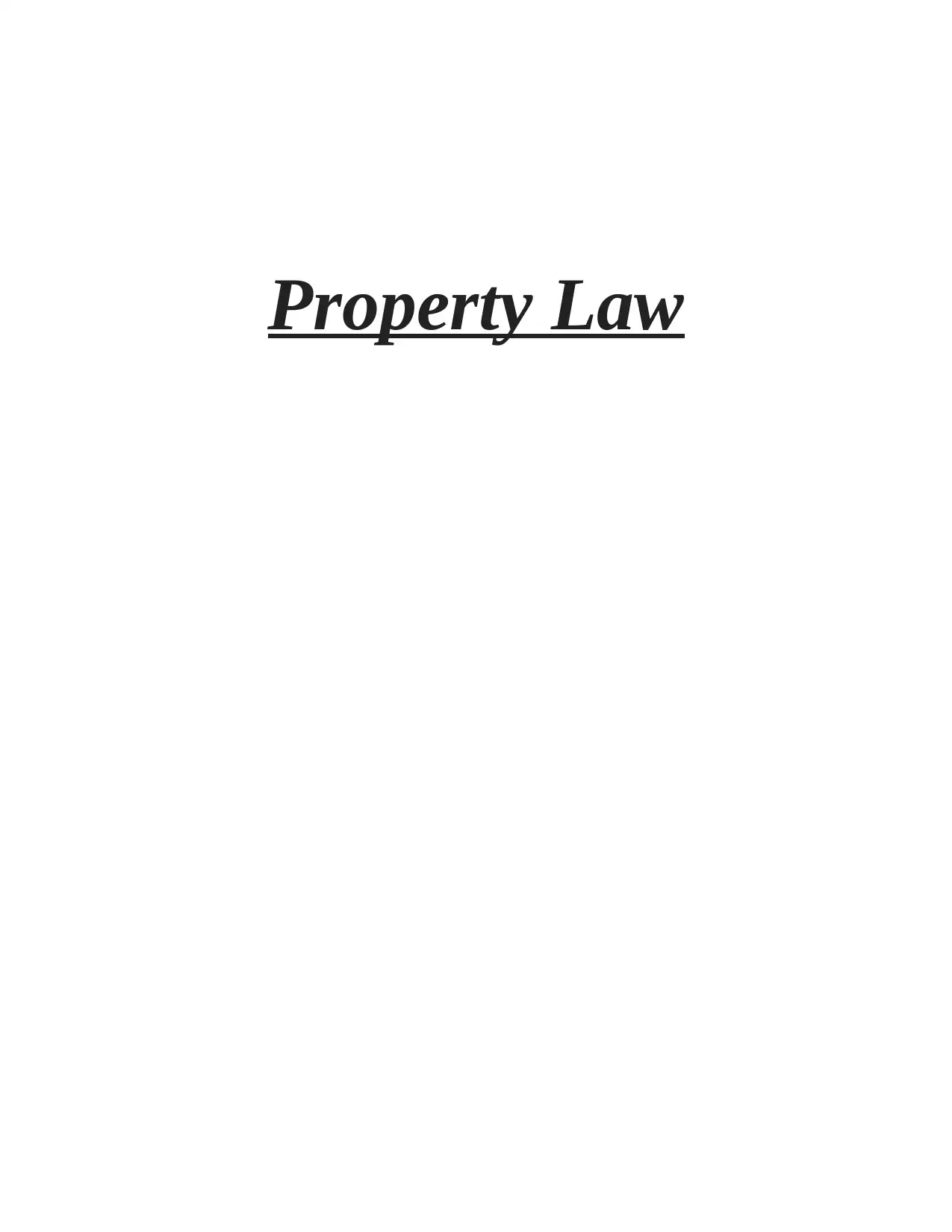
Property Law
Paraphrase This Document
Need a fresh take? Get an instant paraphrase of this document with our AI Paraphraser
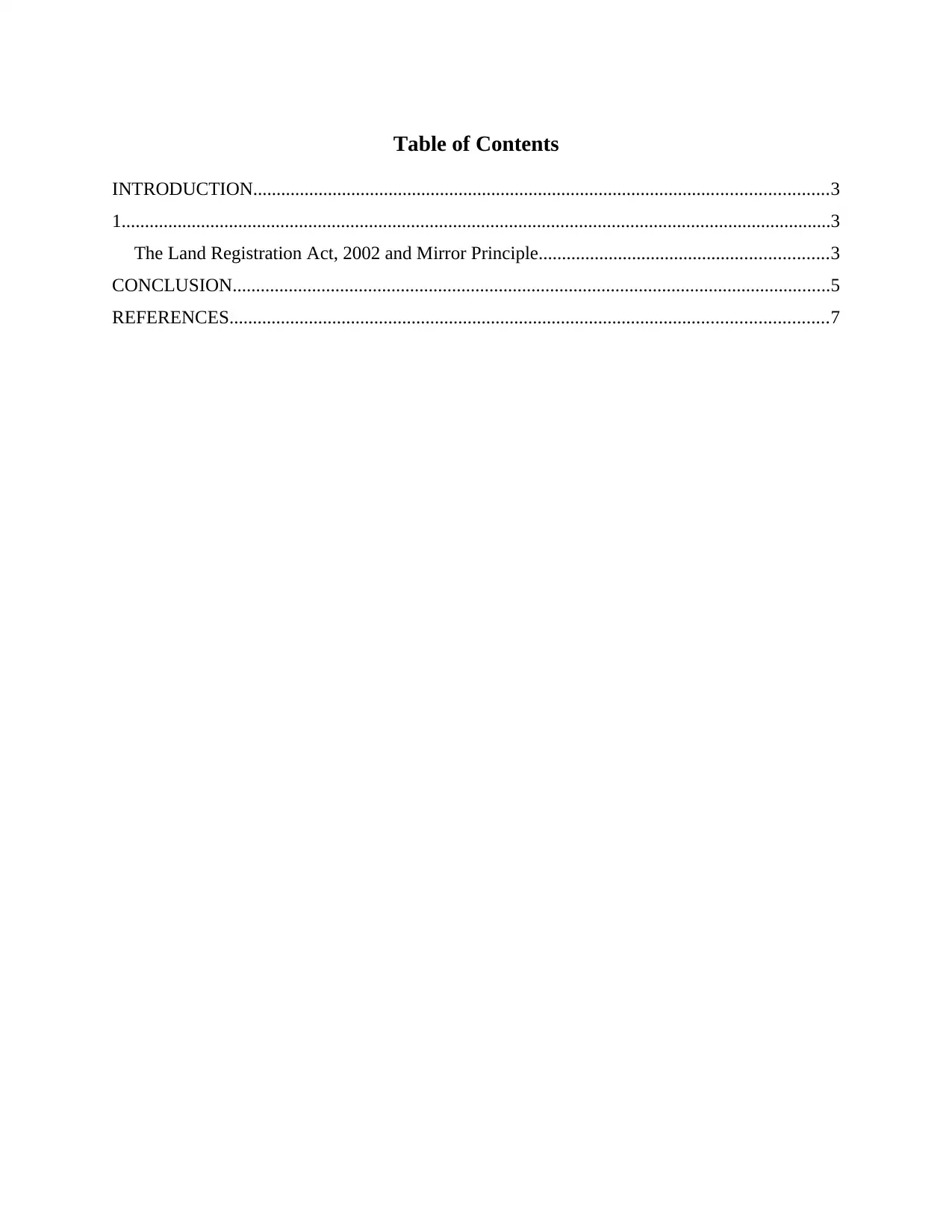
Table of Contents
INTRODUCTION...........................................................................................................................3
1........................................................................................................................................................3
The Land Registration Act, 2002 and Mirror Principle..............................................................3
CONCLUSION................................................................................................................................5
REFERENCES................................................................................................................................7
INTRODUCTION...........................................................................................................................3
1........................................................................................................................................................3
The Land Registration Act, 2002 and Mirror Principle..............................................................3
CONCLUSION................................................................................................................................5
REFERENCES................................................................................................................................7
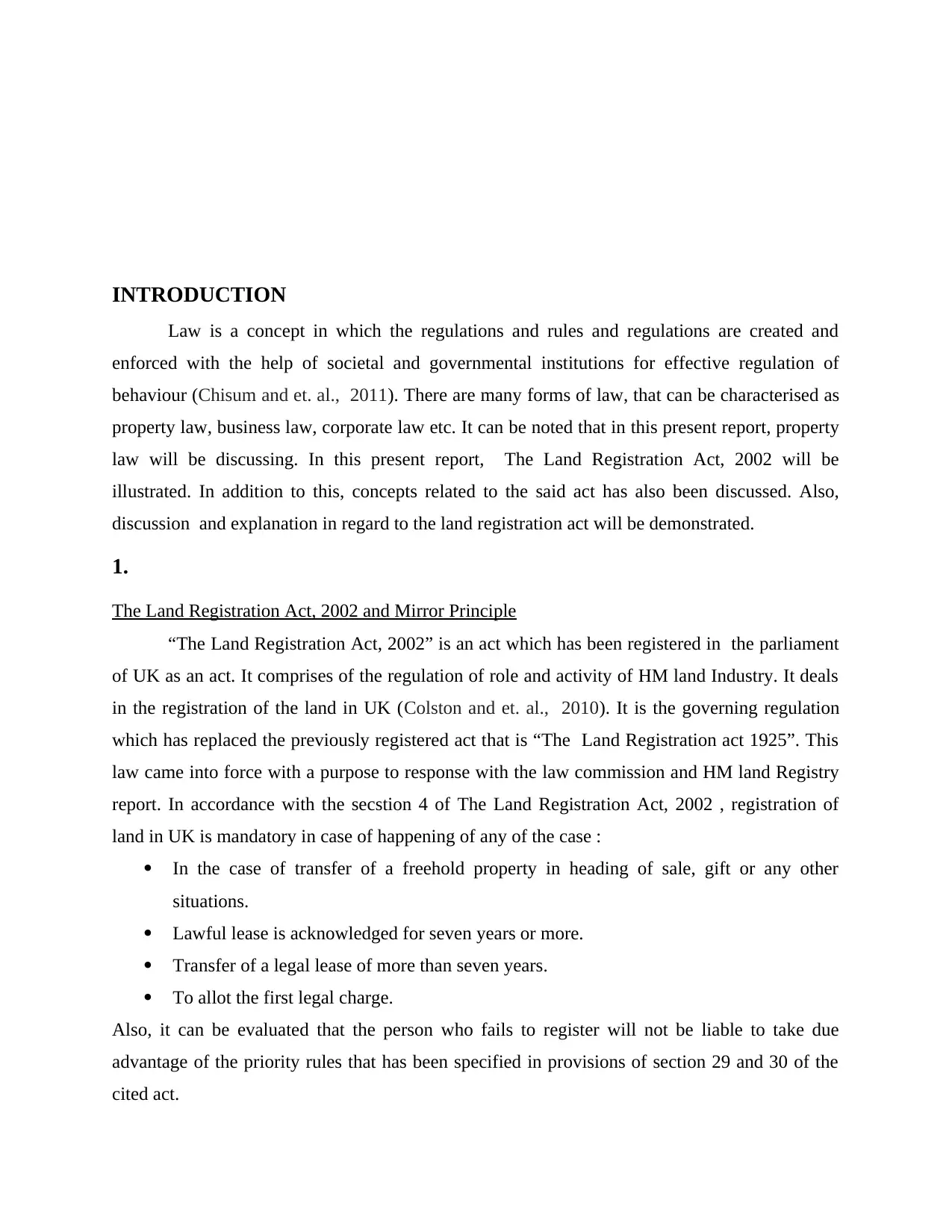
INTRODUCTION
Law is a concept in which the regulations and rules and regulations are created and
enforced with the help of societal and governmental institutions for effective regulation of
behaviour (Chisum and et. al., 2011). There are many forms of law, that can be characterised as
property law, business law, corporate law etc. It can be noted that in this present report, property
law will be discussing. In this present report, The Land Registration Act, 2002 will be
illustrated. In addition to this, concepts related to the said act has also been discussed. Also,
discussion and explanation in regard to the land registration act will be demonstrated.
1.
The Land Registration Act, 2002 and Mirror Principle
“The Land Registration Act, 2002” is an act which has been registered in the parliament
of UK as an act. It comprises of the regulation of role and activity of HM land Industry. It deals
in the registration of the land in UK (Colston and et. al., 2010). It is the governing regulation
which has replaced the previously registered act that is “The Land Registration act 1925”. This
law came into force with a purpose to response with the law commission and HM land Registry
report. In accordance with the secstion 4 of The Land Registration Act, 2002 , registration of
land in UK is mandatory in case of happening of any of the case :
In the case of transfer of a freehold property in heading of sale, gift or any other
situations.
Lawful lease is acknowledged for seven years or more.
Transfer of a legal lease of more than seven years.
To allot the first legal charge.
Also, it can be evaluated that the person who fails to register will not be liable to take due
advantage of the priority rules that has been specified in provisions of section 29 and 30 of the
cited act.
Law is a concept in which the regulations and rules and regulations are created and
enforced with the help of societal and governmental institutions for effective regulation of
behaviour (Chisum and et. al., 2011). There are many forms of law, that can be characterised as
property law, business law, corporate law etc. It can be noted that in this present report, property
law will be discussing. In this present report, The Land Registration Act, 2002 will be
illustrated. In addition to this, concepts related to the said act has also been discussed. Also,
discussion and explanation in regard to the land registration act will be demonstrated.
1.
The Land Registration Act, 2002 and Mirror Principle
“The Land Registration Act, 2002” is an act which has been registered in the parliament
of UK as an act. It comprises of the regulation of role and activity of HM land Industry. It deals
in the registration of the land in UK (Colston and et. al., 2010). It is the governing regulation
which has replaced the previously registered act that is “The Land Registration act 1925”. This
law came into force with a purpose to response with the law commission and HM land Registry
report. In accordance with the secstion 4 of The Land Registration Act, 2002 , registration of
land in UK is mandatory in case of happening of any of the case :
In the case of transfer of a freehold property in heading of sale, gift or any other
situations.
Lawful lease is acknowledged for seven years or more.
Transfer of a legal lease of more than seven years.
To allot the first legal charge.
Also, it can be evaluated that the person who fails to register will not be liable to take due
advantage of the priority rules that has been specified in provisions of section 29 and 30 of the
cited act.
⊘ This is a preview!⊘
Do you want full access?
Subscribe today to unlock all pages.

Trusted by 1+ million students worldwide
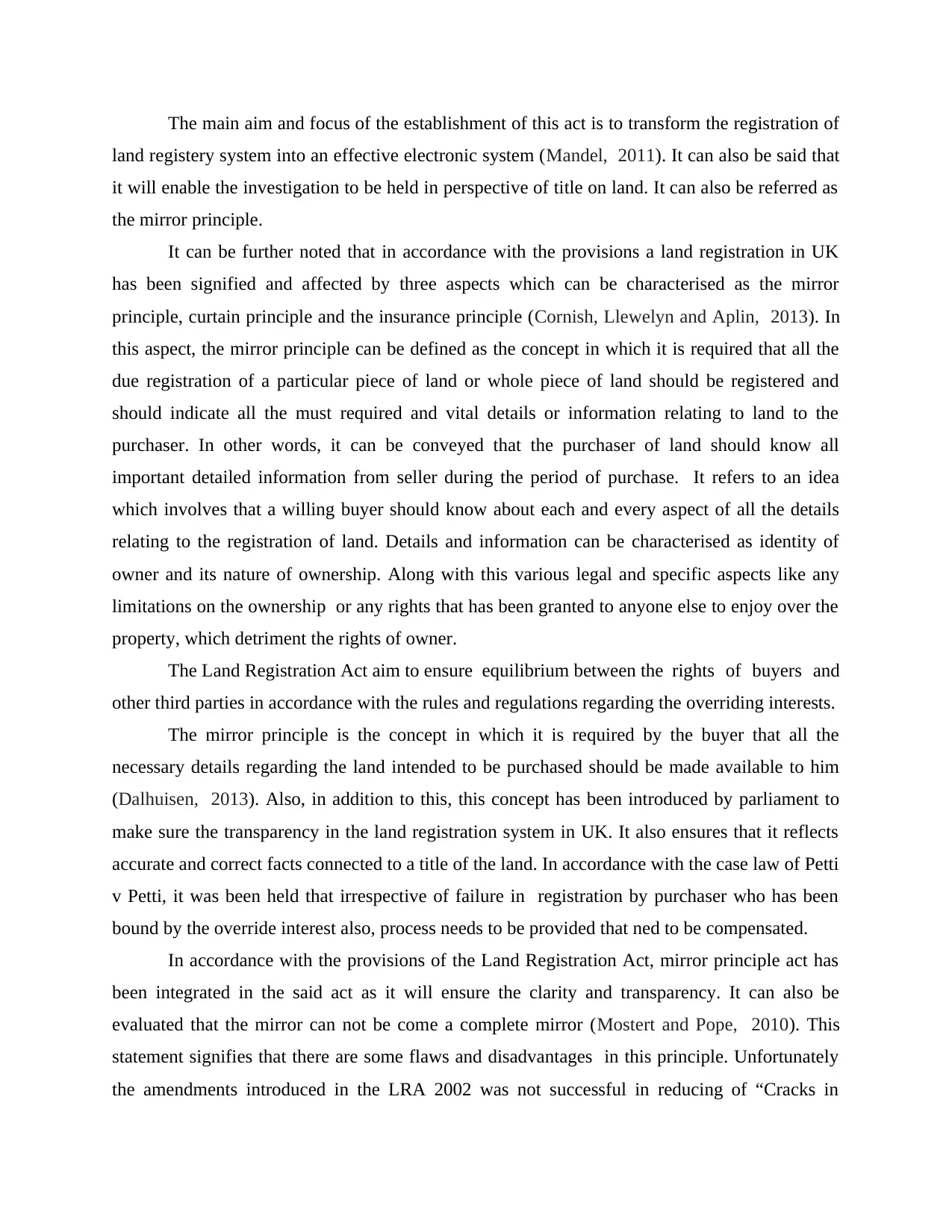
The main aim and focus of the establishment of this act is to transform the registration of
land registery system into an effective electronic system (Mandel, 2011). It can also be said that
it will enable the investigation to be held in perspective of title on land. It can also be referred as
the mirror principle.
It can be further noted that in accordance with the provisions a land registration in UK
has been signified and affected by three aspects which can be characterised as the mirror
principle, curtain principle and the insurance principle (Cornish, Llewelyn and Aplin, 2013). In
this aspect, the mirror principle can be defined as the concept in which it is required that all the
due registration of a particular piece of land or whole piece of land should be registered and
should indicate all the must required and vital details or information relating to land to the
purchaser. In other words, it can be conveyed that the purchaser of land should know all
important detailed information from seller during the period of purchase. It refers to an idea
which involves that a willing buyer should know about each and every aspect of all the details
relating to the registration of land. Details and information can be characterised as identity of
owner and its nature of ownership. Along with this various legal and specific aspects like any
limitations on the ownership or any rights that has been granted to anyone else to enjoy over the
property, which detriment the rights of owner.
The Land Registration Act aim to ensure equilibrium between the rights of buyers and
other third parties in accordance with the rules and regulations regarding the overriding interests.
The mirror principle is the concept in which it is required by the buyer that all the
necessary details regarding the land intended to be purchased should be made available to him
(Dalhuisen, 2013). Also, in addition to this, this concept has been introduced by parliament to
make sure the transparency in the land registration system in UK. It also ensures that it reflects
accurate and correct facts connected to a title of the land. In accordance with the case law of Petti
v Petti, it was been held that irrespective of failure in registration by purchaser who has been
bound by the override interest also, process needs to be provided that ned to be compensated.
In accordance with the provisions of the Land Registration Act, mirror principle act has
been integrated in the said act as it will ensure the clarity and transparency. It can also be
evaluated that the mirror can not be come a complete mirror (Mostert and Pope, 2010). This
statement signifies that there are some flaws and disadvantages in this principle. Unfortunately
the amendments introduced in the LRA 2002 was not successful in reducing of “Cracks in
land registery system into an effective electronic system (Mandel, 2011). It can also be said that
it will enable the investigation to be held in perspective of title on land. It can also be referred as
the mirror principle.
It can be further noted that in accordance with the provisions a land registration in UK
has been signified and affected by three aspects which can be characterised as the mirror
principle, curtain principle and the insurance principle (Cornish, Llewelyn and Aplin, 2013). In
this aspect, the mirror principle can be defined as the concept in which it is required that all the
due registration of a particular piece of land or whole piece of land should be registered and
should indicate all the must required and vital details or information relating to land to the
purchaser. In other words, it can be conveyed that the purchaser of land should know all
important detailed information from seller during the period of purchase. It refers to an idea
which involves that a willing buyer should know about each and every aspect of all the details
relating to the registration of land. Details and information can be characterised as identity of
owner and its nature of ownership. Along with this various legal and specific aspects like any
limitations on the ownership or any rights that has been granted to anyone else to enjoy over the
property, which detriment the rights of owner.
The Land Registration Act aim to ensure equilibrium between the rights of buyers and
other third parties in accordance with the rules and regulations regarding the overriding interests.
The mirror principle is the concept in which it is required by the buyer that all the
necessary details regarding the land intended to be purchased should be made available to him
(Dalhuisen, 2013). Also, in addition to this, this concept has been introduced by parliament to
make sure the transparency in the land registration system in UK. It also ensures that it reflects
accurate and correct facts connected to a title of the land. In accordance with the case law of Petti
v Petti, it was been held that irrespective of failure in registration by purchaser who has been
bound by the override interest also, process needs to be provided that ned to be compensated.
In accordance with the provisions of the Land Registration Act, mirror principle act has
been integrated in the said act as it will ensure the clarity and transparency. It can also be
evaluated that the mirror can not be come a complete mirror (Mostert and Pope, 2010). This
statement signifies that there are some flaws and disadvantages in this principle. Unfortunately
the amendments introduced in the LRA 2002 was not successful in reducing of “Cracks in
Paraphrase This Document
Need a fresh take? Get an instant paraphrase of this document with our AI Paraphraser
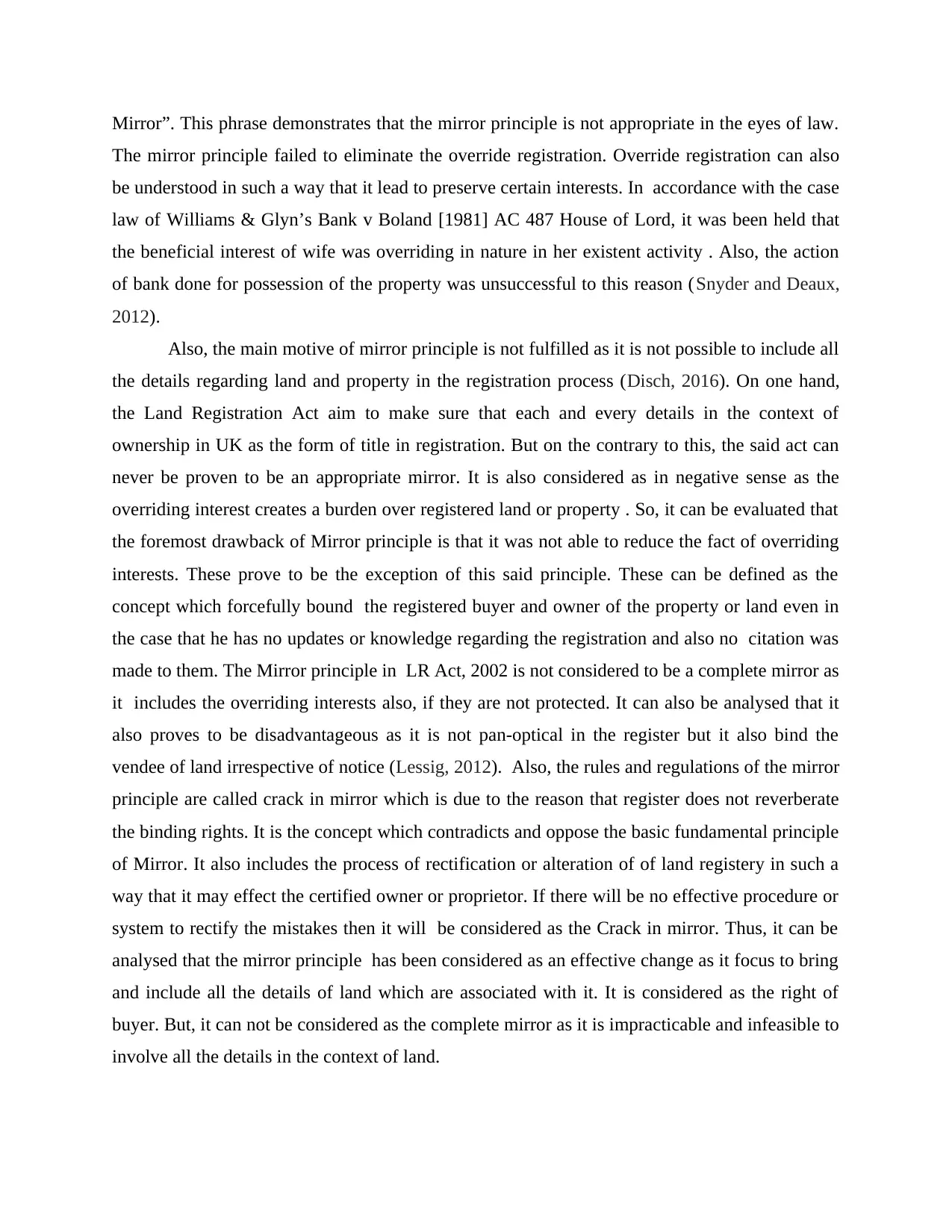
Mirror”. This phrase demonstrates that the mirror principle is not appropriate in the eyes of law.
The mirror principle failed to eliminate the override registration. Override registration can also
be understood in such a way that it lead to preserve certain interests. In accordance with the case
law of Williams & Glyn’s Bank v Boland [1981] AC 487 House of Lord, it was been held that
the beneficial interest of wife was overriding in nature in her existent activity . Also, the action
of bank done for possession of the property was unsuccessful to this reason (Snyder and Deaux,
2012).
Also, the main motive of mirror principle is not fulfilled as it is not possible to include all
the details regarding land and property in the registration process (Disch, 2016). On one hand,
the Land Registration Act aim to make sure that each and every details in the context of
ownership in UK as the form of title in registration. But on the contrary to this, the said act can
never be proven to be an appropriate mirror. It is also considered as in negative sense as the
overriding interest creates a burden over registered land or property . So, it can be evaluated that
the foremost drawback of Mirror principle is that it was not able to reduce the fact of overriding
interests. These prove to be the exception of this said principle. These can be defined as the
concept which forcefully bound the registered buyer and owner of the property or land even in
the case that he has no updates or knowledge regarding the registration and also no citation was
made to them. The Mirror principle in LR Act, 2002 is not considered to be a complete mirror as
it includes the overriding interests also, if they are not protected. It can also be analysed that it
also proves to be disadvantageous as it is not pan-optical in the register but it also bind the
vendee of land irrespective of notice (Lessig, 2012). Also, the rules and regulations of the mirror
principle are called crack in mirror which is due to the reason that register does not reverberate
the binding rights. It is the concept which contradicts and oppose the basic fundamental principle
of Mirror. It also includes the process of rectification or alteration of of land registery in such a
way that it may effect the certified owner or proprietor. If there will be no effective procedure or
system to rectify the mistakes then it will be considered as the Crack in mirror. Thus, it can be
analysed that the mirror principle has been considered as an effective change as it focus to bring
and include all the details of land which are associated with it. It is considered as the right of
buyer. But, it can not be considered as the complete mirror as it is impracticable and infeasible to
involve all the details in the context of land.
The mirror principle failed to eliminate the override registration. Override registration can also
be understood in such a way that it lead to preserve certain interests. In accordance with the case
law of Williams & Glyn’s Bank v Boland [1981] AC 487 House of Lord, it was been held that
the beneficial interest of wife was overriding in nature in her existent activity . Also, the action
of bank done for possession of the property was unsuccessful to this reason (Snyder and Deaux,
2012).
Also, the main motive of mirror principle is not fulfilled as it is not possible to include all
the details regarding land and property in the registration process (Disch, 2016). On one hand,
the Land Registration Act aim to make sure that each and every details in the context of
ownership in UK as the form of title in registration. But on the contrary to this, the said act can
never be proven to be an appropriate mirror. It is also considered as in negative sense as the
overriding interest creates a burden over registered land or property . So, it can be evaluated that
the foremost drawback of Mirror principle is that it was not able to reduce the fact of overriding
interests. These prove to be the exception of this said principle. These can be defined as the
concept which forcefully bound the registered buyer and owner of the property or land even in
the case that he has no updates or knowledge regarding the registration and also no citation was
made to them. The Mirror principle in LR Act, 2002 is not considered to be a complete mirror as
it includes the overriding interests also, if they are not protected. It can also be analysed that it
also proves to be disadvantageous as it is not pan-optical in the register but it also bind the
vendee of land irrespective of notice (Lessig, 2012). Also, the rules and regulations of the mirror
principle are called crack in mirror which is due to the reason that register does not reverberate
the binding rights. It is the concept which contradicts and oppose the basic fundamental principle
of Mirror. It also includes the process of rectification or alteration of of land registery in such a
way that it may effect the certified owner or proprietor. If there will be no effective procedure or
system to rectify the mistakes then it will be considered as the Crack in mirror. Thus, it can be
analysed that the mirror principle has been considered as an effective change as it focus to bring
and include all the details of land which are associated with it. It is considered as the right of
buyer. But, it can not be considered as the complete mirror as it is impracticable and infeasible to
involve all the details in the context of land.
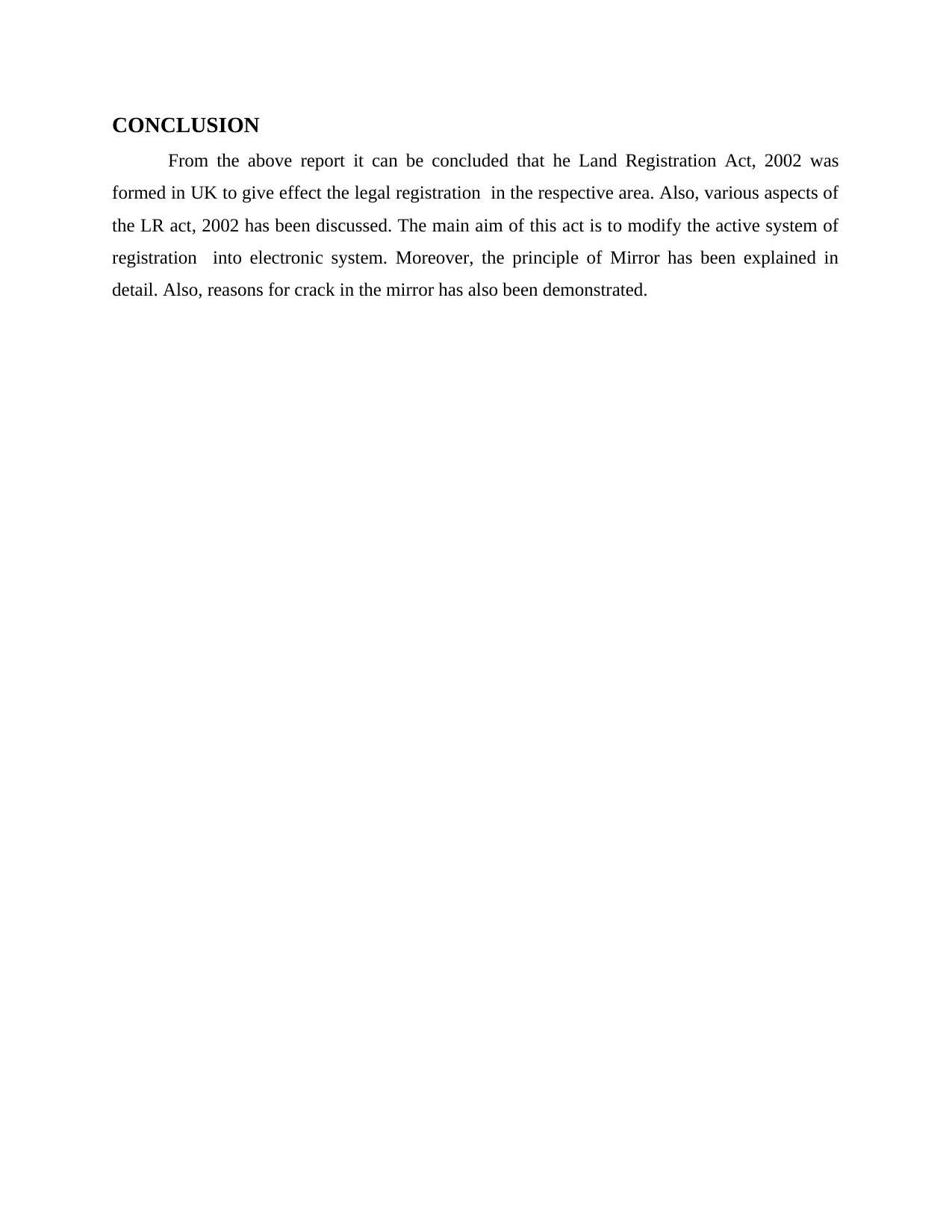
CONCLUSION
From the above report it can be concluded that he Land Registration Act, 2002 was
formed in UK to give effect the legal registration in the respective area. Also, various aspects of
the LR act, 2002 has been discussed. The main aim of this act is to modify the active system of
registration into electronic system. Moreover, the principle of Mirror has been explained in
detail. Also, reasons for crack in the mirror has also been demonstrated.
From the above report it can be concluded that he Land Registration Act, 2002 was
formed in UK to give effect the legal registration in the respective area. Also, various aspects of
the LR act, 2002 has been discussed. The main aim of this act is to modify the active system of
registration into electronic system. Moreover, the principle of Mirror has been explained in
detail. Also, reasons for crack in the mirror has also been demonstrated.
⊘ This is a preview!⊘
Do you want full access?
Subscribe today to unlock all pages.

Trusted by 1+ million students worldwide

Paraphrase This Document
Need a fresh take? Get an instant paraphrase of this document with our AI Paraphraser
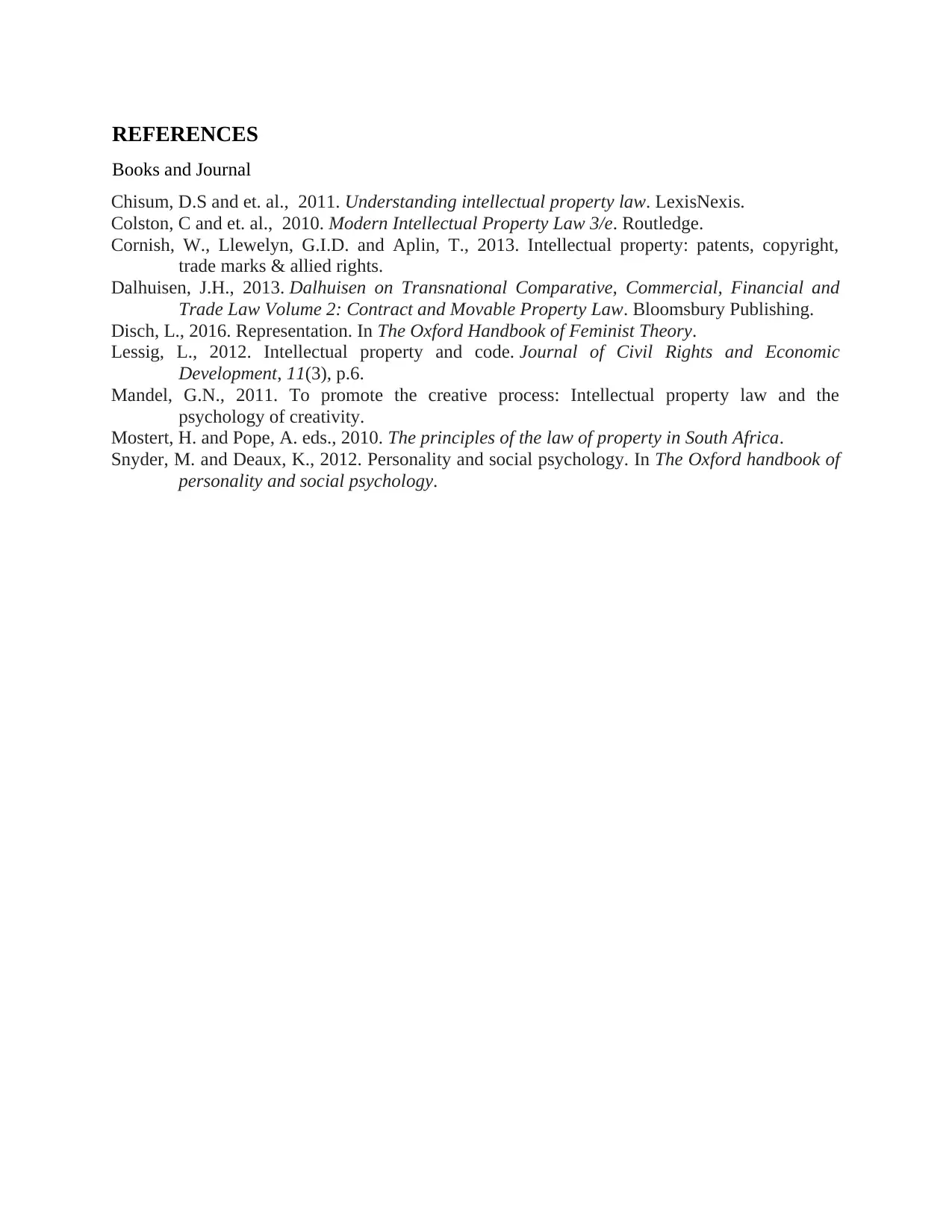
REFERENCES
Books and Journal
Chisum, D.S and et. al., 2011. Understanding intellectual property law. LexisNexis.
Colston, C and et. al., 2010. Modern Intellectual Property Law 3/e. Routledge.
Cornish, W., Llewelyn, G.I.D. and Aplin, T., 2013. Intellectual property: patents, copyright,
trade marks & allied rights.
Dalhuisen, J.H., 2013. Dalhuisen on Transnational Comparative, Commercial, Financial and
Trade Law Volume 2: Contract and Movable Property Law. Bloomsbury Publishing.
Disch, L., 2016. Representation. In The Oxford Handbook of Feminist Theory.
Lessig, L., 2012. Intellectual property and code. Journal of Civil Rights and Economic
Development, 11(3), p.6.
Mandel, G.N., 2011. To promote the creative process: Intellectual property law and the
psychology of creativity.
Mostert, H. and Pope, A. eds., 2010. The principles of the law of property in South Africa.
Snyder, M. and Deaux, K., 2012. Personality and social psychology. In The Oxford handbook of
personality and social psychology.
Books and Journal
Chisum, D.S and et. al., 2011. Understanding intellectual property law. LexisNexis.
Colston, C and et. al., 2010. Modern Intellectual Property Law 3/e. Routledge.
Cornish, W., Llewelyn, G.I.D. and Aplin, T., 2013. Intellectual property: patents, copyright,
trade marks & allied rights.
Dalhuisen, J.H., 2013. Dalhuisen on Transnational Comparative, Commercial, Financial and
Trade Law Volume 2: Contract and Movable Property Law. Bloomsbury Publishing.
Disch, L., 2016. Representation. In The Oxford Handbook of Feminist Theory.
Lessig, L., 2012. Intellectual property and code. Journal of Civil Rights and Economic
Development, 11(3), p.6.
Mandel, G.N., 2011. To promote the creative process: Intellectual property law and the
psychology of creativity.
Mostert, H. and Pope, A. eds., 2010. The principles of the law of property in South Africa.
Snyder, M. and Deaux, K., 2012. Personality and social psychology. In The Oxford handbook of
personality and social psychology.

⊘ This is a preview!⊘
Do you want full access?
Subscribe today to unlock all pages.

Trusted by 1+ million students worldwide

1 out of 10
Related Documents
Your All-in-One AI-Powered Toolkit for Academic Success.
+13062052269
info@desklib.com
Available 24*7 on WhatsApp / Email
![[object Object]](/_next/static/media/star-bottom.7253800d.svg)
Unlock your academic potential
Copyright © 2020–2025 A2Z Services. All Rights Reserved. Developed and managed by ZUCOL.





